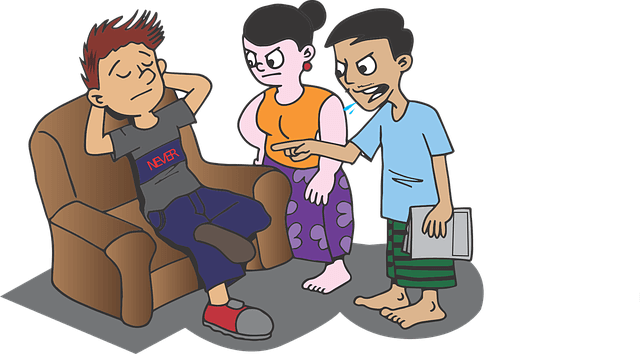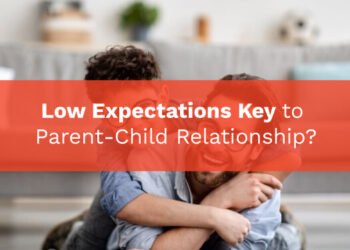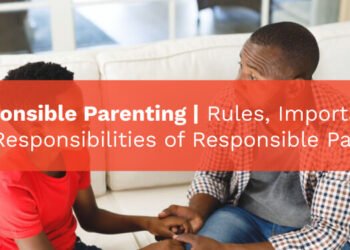Are you updated with what your kid is doing lately? Does your kid know what is up with you? You live under the same roof, rooms are nearby, but your hearts and words can be far away. What is the situation of the communication between you and your child? It is essential for parents to know and think about parent-child communication.
Communication is the main essence of a relationship. The relationship between family members needs to be solid and unaffected by any others. When there is proper communication between parent and child, the whole family is unhappy.

A healthy association is necessary for good decisions inside the family. The home scenario also affects entire members of a family. If you have a problem going on in your life, your kid will be affected. If your kid has some problem, then you will be influenced by it. This process is the basis for whole child-parent communication.
With better communication, you develop trust, love, and most importantly, you will be there for each other. Children look for their parents in every action they perform. They take you as a role model and do not hesitate to imitate you. You as parents have enormous responsibility of being kids’ ideal and providing at the same time.
Children need to fulfill their parent’s expectations. With communication, there is better understanding. Parents can think from a child’s perspective, and children can think from a parent’s perspective. Acceptance is how conflict resolution regarding family is solved.
Why Is Parent-Child Communication Important?
Everyone wishes to be the best parent for their kid. No doubt between the love that prevails between a parent and child. But the most important thing about communication is comfort.
Suppose if your child is comfortable around you they will share everything with you. When you listen to them, there are high chances that they obey and follow what you ask them to do. The sense of safety and wellness and trust binds them closer to you. They accept your advice and ideas and believe that you want the best for them.
Due to a lack of communication between parent and child, a lot of problems arise. With parents sometimes kids are close to one of the parents. There are problems when kids do not communicate with both or any one of the parent. Some of them are:
Behavioral Problems In Kids
Kids stop listening to elders and get involved in immoral activities. These kids can grow up to be criminals or abusers when there is a lack of communication between family members.
False Assumptions
When you and your kid don’t communicate well, there can be a series of assumptions. You end up misinterpreting your kid and your kid misinterprets you. This confusion can lead to conflict and a lack of understanding.
Fear, Stress And Low Self-esteem
Family is the biggest strength for all family members. When there is less communication or no communication at all, stress prevails in both parents and kids. Home feels like a place where you are forced to go.
Family bonds and interconnection have a lot to do with self-esteem. Kids need parents for most of the things. Parents and kids who do not interact verbally or by any means of communication can have low self-esteem. When communication takes place after a long disconnection, kids are fearful of their parents.
How Do Parents & Kids Communicate In Different Situations?

When you interact with your kid or your kids interact with you, it may not always be a friendly conversation. Some conversations are serious; some demand authority from you. At times you even have to command your kids. Here are different styles of communication:
A Normal Conversation And Authority
A typical conversation is the one you have daily. It could be about the day spent at school or your day at the office. Your kids can talk about their teachers, friends, and their school life. Regular conversations denote healthy family relationships.
Authorization is a situation where your kids require permission from you. You give authority, and kids obey it. It could be when your kid has to go for a night out with friends or staying in their peer’s house for a night. They will need to have permission from you.
If your kids are living with you, they require your permission. It is up to you to disallow them for what they want. When you disapprove of something, do not hurt them. Instead, make them understand the reason behind your decision, so they conform to it.
Pluralistic
In this type of conversation, the authority is not centric to parents. You kids, too, can have a say in a situation. It could be a time when you plan for a trip to a place. Parents and kids can sit together and choose a place to visit.
Another example can be when you take your kid shopping. Ask them what they want and let them decide. In pluralistic conversations, always listen to your kid and know what the decision from their side is. Appreciate their views and accept their ideas.
Consensual
A consensual conversation includes authority and conversation to reach a decision. Kids may not always agree to a decision made by you.
In a consensual conversation, your kids accept the truth and understand the reason behind the decision. They agree with what you put forward. This reduces the chances of conflict and promotes a level of understanding among parents and children. However, having this kind of conversation among your rebellious teens can be rare.
Laissez-Faire
Laissez-faire communication is the one in which there is no regard for parents’ opinions. Similarly, parents do not ask for kids. Kids have the freedom to make their own decision without being obliged by their parents. Parents, do not care what kids are up to or where they are.
This uncaring attitude from both sides signals total disconnection between parents and kids. This communication gap can result if two parents are divorced or if the parents are having problems, and the child lives with only one of them. Some kids don’t seek elders at all. For such a situation, it is good to have a conversation with your kids or conceal them. It is best if such a situation never arises.
Protective
You become an overprotective parent when you take entire authority into your hands and do not listen to their ideas, and expect them to follow whatever you tell them. Kids are scared to have conversations with you or sharing their problems with you.
You will continue to give the authority without knowing what they are feeling. As a result of your protectiveness towards your kids, your kids might start to lose confidence.
Hence, try to be flexible and understanding parents towards your kids. They want parents to know how they feel. Do not interrupt your kid and say that you are protective. Being protective is not an excuse to manipulate your kids. As a parent, you need to adjust to one of these communication styles while interacting with your kids.
How And When To Communicate With Your Child?
1. Start Now And Early
When was the last time you talked wholeheartedly with your child? Was it during breakfast? If it has been a while, then go right now. Start communicating with your kid at this very moment. It is usually the best time to start the communication flow when your kid is young.
When kids reach the age of uttering sentences correctly, start communication. Shower them with love and affection so that they listen to you and agree to what you say. Communicating from an early age builds trust and makes parent-child relations robust. You need to accept children for who they are.
There are different types of ways for communication:
Verbal Communication
Verbally you can express what you feel for your kids. Let them know you appreciate them for who they are. Use dialects like “I appreciate that you clean your room.” Encourage them if they do something good. Always compliment them if they do something good.
If you are busy and they need your help. Fix another time to help children. Explain your work and unavailability. Do not use direct language like “Do not disturb me. I am busy”. Usage of such lines will make your child feel unwanted and uncared.
Non-verbal Communication
Non-verbal communication includes gestures and facial expressions. When you meet your kid at the end of the day, show them how happy you are to see them with a smile. If you had a bad day do not shout at your kids. You can hug your kids and express love towards them.
Maintain a different mood at home try to be calm, patient, and polite. Remember, your kids are copying the mannerisms and habits. If you become angry and react, your kids will feel guilty for something they did not do.
Virtual Communication
You can be a way for work or business trip trying new food, exploring new places or getting busy with your work. Call your kids and inform them about the trip. When you have to live far, stay updated with the changes in their lives and keep communication alive with phone calls or via social media like Facebook, Viber, etc.
Written Communication
Written communication includes texting during the day. You can keep chatting with your kids. Sometimes if kids are shy or unable to express their thoughts visually or verbally, they can express themselves via letter or writing.
Visual Communication
Visual communication includes talking to your kid directly on the face. Suppose they are lying or telling the truth. You can know how willing your child is for the things you have asked them to do. Visual communication reveals a lot, and you need to trace what they are thinking psychologically.
2. Know That They Are Kids
Understand that when you are conversing with your kids, they do not know complex words. If your kid is too small, you might have to use child language to explain things. Make sure you never use inappropriate language in front of your kids. If there are some adult stuff discussions at home, then make sure kids are not around.
When forbidding them from doing something, say it in a sweet tone. Start by “It is better if you put trash in the dustbin,” not “how dare you to throw litter around your room.” Kids are sensitive and sometimes take things the other way round. Be kind and careful when you command them. Command in a way that does not sound commanding at all.
If you do not understand something kids say or if they speak something wrong. Do not correct them directly or interrupt them. Let them speak, and you can correct them later. Do not make them feel inferior or less intellectual.
3. Listen To Them
Conversation between you and your kid is essential, and it is even more necessary for you to listen to them. Kids learn patience from you. Show some interest when your child wishes to talk to you. Here is a list of ways for you to listen properly to your child.
Look into their eyes
While interacting with your child, maintain eye contact. Looking into their eyes assures that you are paying attention, and your kid will express their views with confidence.
Talk in silence
When you are talking or giving time to your children, keep other distractions at bay. If you get a call from somewhere, make sure to listen to them by keeping the call in a halt. You can talk to them in silence by turning the television off or keeping the reading material away.
Do not talk when your kid is speaking
Kids, when they speak to you, want you to listen to them appropriately. Let them finish their line, and then you can continue. Have a systematic conversation in which both of you get to express your view openly.
Let them know you are paying attention
You can show your kid speaking by gestures like nodding your head or smiling at them after they speak. Make them feel that you are entirely listening to them.
4. Communicate Daily, Schedule Time
You can schedule a specific time to talk with your child. It can be dinner time at night or breakfast in the morning. You must know what is happening to your kid daily. The habit of talking daily at a feasible time is an excellent way to strengthen the child-parent bond.
5. Short Conversations Frequently
In your busy schedule having long conversations, every day might not be possible. The smaller your kid is, you may run out of topics to discuss. So it is best to have shorter conversations but frequent ones. Within a short time, you can know what your kid is doing. When you converse daily, it is easier for you to ask questions.
Kids even answer personal questions like their new friends, new hobbies, lovers, or who they are talking to once they are comfortable talking to you. Frequent exchange of words with your kids will make you closer to them.
6. Tell Them Your Side of Story
As a parent, you cannot always agree with what your kids say in situations where you have to opposite thought. In such cases try to explain to them your perception.
For instance, if you cannot attend certain school functions, let them know it was due to a hectic schedule, and you will be there from next time. Make them clear about the meaning of your dialects. Try to show them things from your perspective.
7. Plan For Family Outing
A trip to new places is an excellent time to converse with your child. In a fresh mood, you can plan and talk about more important things regarding life. For instance, a picnic is also a time to teach them skills like swimming, fishing, and other skills.
During family outings, you will have enough time with your kids, you can talk to them about anything and everything. Try to use such family outings try to improve communication and reduce grudges or problems if your kids have upon you.
8. Do Not Act As You Know Everything
You know more and better than the kids. But never make them realize that you are better than them or others are better than them. The comparison of intellect leads to low self-esteem. Teach kids and share knowledge. Sometimes there is a lot to learn from kids too. At times parents take care of kids computer.
To make your kids feel confident about what they know ask them questions even if you know the correct answer. This will boost their confidence and they will feel like they are helping you to solve their problems. Kids can make use of Alexa and in between conversations try to build the learning environment so that you and your kids both can enhance your knowledge. Some applications like Discord need proper knowledge before letting kids use it and you as a parent need awareness about it.
9. Avoid Incomplete Conversations
Due to inappropriate timing or other situations, your lines or views can remain incomplete. Come back and complete what you wanted to portray your kid. Very often, kids misinterpret incomplete conversations that can lead to difficult situations.
Sometimes while having a conversation with your kids during breakfast, your kids’ school bus arrives and your conversation gets incomplete. In such time, continue the conversation once they are back home or during dinner time. But never ever let your conversation go incomplete especially when you are having some important discussion going on.
Have You Been Communicating Well With Your Kids?
There are not always flowers blooming in the garden of parenting. Times when you and your kid’s talk and fights are inevitable. Due to the generation gap, there is no doubt there is opposition in thoughts between your parents and children. But these problems reach ashore with proper communication. The conflict happening between a parent and a child is resolvable only through proper communication.

The reason most problems arise between parent and child is also wrong or misinterpreted communication. It is wise to solve such problems by sitting with your kid and having proper communication. During the communication, try to resolve the difference in thought between you and your kids.
Communication During Conflict
Here are some tips to help you resolve the conflict between you and your kid:
Sit Together To Solve The Problem
When you have to talk to your kid after a fight, then do not extend it or postpone it. Try to solve it by concluding the thought. Find creative ways to cope with problems and do not bring newer issues while one is about to find a solution.
Be Polite
Just because you are angry doesn’t mean you should speak ruthlessly with your young ones. Remember that you are the parent, and you are speaking in front of your kids. Do not forget your kids will learn every word you speak and might use them on you or someone else. So be polite and try to solve the issue in a polite a manner as possible.
Share Your Part of Disassociation
When you are negotiating, let them know which point you are unable to agree with theirs. Use terms like I when explaining. “I do not like it that you lied to me.” When you express the point you cannot cooperate, kids will think about it and try to improve the next time.
Be Forgiving
Kids commit mistakes, and when they are sorry, they mean it. You need to teach them the importance of forgiveness. Be kind and forgiving such that they don’t repeat the mistake.
Once your kids realize their mistake and have accepted their mistake do not taunt about the mistake again and again. Taunting your kids about their mistakes, again and again, will not help to improve their mistakes. But if you forgive your kids for their mistakes they will never repeat their mistakes again.
Avoid These Habits When Communicating With Kids

Do Not Nag Kids
Nagging kids about minor things, again and again, will get them irritated. They lose self-esteem when nothing they do seems right to them. Nagging time and again makes children resentful. They stop taking you seriously and do not listen to you carefully.
Stop Criticizing
Parents criticizing the way kids all the time is not a good thing. Everyone is different, and you should accept your kids for who they are and what they want with their life. If you criticize your kids for their actions and words, then they stop their actions. Complaining about the way of thinking kills creativity. You should try to encourage your kids for whatever they are doing and even if they fail at it motivate them instead of criticizing them.
Do not Yell or Interrupt
Interrupting the conversation makes your kids realize that their viewpoints and though are less crucial. It makes kids feel as if you do not value them and their point of view does not matter to you at all. They may stop talking to you or expressing their views. As a result, your kids will lose their confidence to express whatever they are feeling or even to talk with other people.
Keep Lectures Short
If you give long lectures to your kids, then they will not grasp every line of it. Ask them to do things with fewer instructions. Giving too much time lecturing kids makes them restless, and your words lose value, and kids get defensive.
Giving long lectures is nothing more than a waste of time for both parents and children. You kids will start to mimic you when you constantly give a long lecture to your kids every time you have a conversation with them. Keeping your lecture short will helps your kids know what you mean and what they should be doing.
Don’t Make Them feel Guilty
Making kids feel guilty for their actions or thoughts is not a good idea. Making kids guilty about their actions will not help to improve mistakes that have already occurred. Dialects like “It is because of you this happened” can make kids feel guilty and ashamed of themselves. It is better to teach children to let go of guilt. Let your kids learn from their mistakes instead of making them feel guilty about them.
Examples From Past
Avoid bringing incidents from the past where your child was at fault or did something wrong. Repetition of past incidents is annoying, and kids may hold grudges. It is better to ask them to forget the past and have a fresh start.
Avoid Sarcasm
Kids may not understand sarcasm and using touches of sarcasm is hurtful and confuses kids. If they keep the room dirty, it’s not wise to say, “Oh, what a tidy room.” It is mean, and children feel insecure when the next bomb of sarcasm is going to burst. It is always better to avoid sarcasm and express clear ideas.
Kids especially small ones can have difficulty dealing with sarcasm. Therefore, as far as possible try not to use sarcasm with your kids.
Do not Lie in front of your kids or With Your Kids
To escape from uncomfortable situations, most of the time parents lie. Make sure you do not lie to your kids. The topics such as sex, adult kinds of stuff are inevitable as your child will seek answers. Be honest, answer in their way but do not lie. Kids grow up and will surely understand everything as they grow old.
Likewise, when you lie in front of your kids, when they know the truth they kids will start to think lying is not a bad thing. And they may start to believe their lie will hurt none.
Denying Their Feelings
Try to understand what your kid is feeling at a particular moment. For instance, your child is not selected for a drama role and is upset. Make an effort to cheer them up by saying dialogues like: “I know you wanted that role, badly, why not try for others?”,” Wanna go out for ice cream?”.
Cheering them up will make your kid happy, and kids need constant encouragement from parents. You are your kid’s strength. Let children know you are always there for him.
Some Communication Builders
Some dialects to build strong communication are:
 “I am listening to you.”
“I am listening to you.”- “Could you explain your side of view?”
- “I understand.”
- “I am here for you.”
- “Tell me more about it.”
- “Sounds interesting.”
- “Wow, that is wonderful.”
- “Go on, do not hesitate.”















